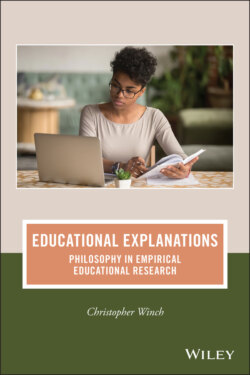Читать книгу Educational Explanations - Christopher Winch - Страница 28
Inappropriate Methods and Flawed Explanations
ОглавлениеMany of the complaints about EER do not focus on the conceptual issues, but rather on whether or not research designs are sufficiently technically robust to sustain the conclusions of their investigations. A particular complaint is that there is a tendency to overgeneralise. Thus Robin Barrow writes on the inadvisability of teachers using EER: ‘…for the teacher should never act on a generalisation, since for all he knows the children he faces, or some other aspect of his situation, are exceptions to the generalisation’ (Barrow 1984, p. 186). Although Barrow points to a real difficulty for EER, he cannot use this claim to assert its impossibility. The statement above is itself an educational generalisation and, if true, refutes the claim that it makes, since at least one educational generalisation is then true. If false it entails that some educational generalisations are true. EER would indeed have difficulties if any generalisation were forbidden. Fortunately that need not be so. First, because the claim itself is incoherent and second because what is meant by a generalisation is over-specified. Barrow appears to treat a generalisation based on educational research as a universally quantified proposition of the form:
For all x, if Fx then Gx
which is refutable by a case of an F which is not G. But although this is how generality is treated in textbooks on deductive logic, it is not necessarily how it is thought of in EER or indeed in many other contexts. We can tolerate some exceptions to a generalisation often because generalisations are implicitly understood to mean ‘Nearly all cases of F are G’. Second, they are very often hedged with an implicit contextual limitation so that they only have a limited range of application. Barrow, however, seems to go further than this and to wish to deny that a teacher (and by implication a researcher) could develop an explanation that applied to more than one pupil at a time. This move, however, raises an issue which we will consider in more detail in the next chapter. A successful explanation of a phenomenon is usually one that allows some purpose to be achieved. This does not entail that it has to describe, in minute detail, all the particulars of a chain of events which purport to be covered by the explanation. It suffices that the phenomenon is explained in such a way as to usually lead to greater understanding of or to the improvement of practice. There are ways of assessing the quality of explanations in this respect which any explanation will need to take account of. To take an example, if one is trying to explain why a method of teaching reading is relatively successful compared to alternative methods, one is required to show that it is a better explanation of why than any other that is practically feasible. It does not require that the explanation is an exhaustive account of every detail of each individual child’s learning to read.
The key point is that explanations have to address particular problems or concerns raised by researchers, not that they either confer certainty or exhaustiveness in relation to the phenomena with which they are concerned.5 If we were to take such objections as the above seriously then educational explanation would be impossible in most cases and thus our knowledge of educational practices could not be attained through systematic investigation. A good case could therefore be made out for saying that it is unknowable. These considerations should lead us to provisionally dismiss objections 2 and 3.
